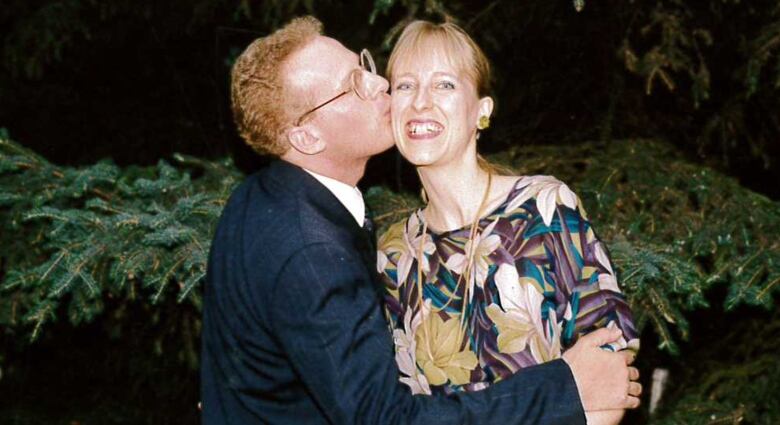5:59First Person: what Jennifer Burgess’ late autism diagnosis taught her
This First Person article is written by Jennifer Burgess, who lives in Calgary. For more information about CBC’s First Person stories, please see the FAQ.
Sitting on my bed, my cellphone pressed to my ear, I had been on the phone with Dr. S. for more than three hours. It was our second multi-hour session in as many weeks.
Finally he gave the news. “I am providing you with a diagnosis of autism spectrum disorder.”
“Oh, that’s great! Thank you!” I replied in what I hoped was a reasonably normal way to respond. I wanted him to know I was grateful for the time he had spent on me, and that I was functional enough to respond appropriately to such news.
On the inside, however, I was feeling nothing. This news wasn’t really news. At 59, I already knew a lot about myself. I knew this diagnosis was a strong possibility.
But then Dr. S. said something else. “You need to know that you haven’t had a life of failure. You’ve had a life of challenges.”
And with those two sentences, he changed my life.
A growing number of adults are getting assessments later in life. Now as one of them, I looked back at my childhood and began to connect the many difficult experiences to being autistic, instead of feeling that there was something fundamentally wrong with me as a person.

For example, when I was five, my next-door neighbour Brent, who was the same age as me, invited me over to see his rock collection. As he showed me the various samples and told me their geological names, I pocketed several when I thought he wasn’t looking.
I knew that stealing was wrong, but my mind didn’t connect this with stealing. It’s just that they were shiny and beautiful and I liked them — and so they should be mine.
His dad stopped me at the front door, grabbed me by the shoulder and poked through all my pockets before reprimanding me and sending me on my way in shame.
In elementary school, I used to walk with my friend Carol. Sometimes we would play outside together on the weekends. I would knock on her front door and then follow her all over the house as she got ready, to her bedroom while she put on her socks and to the back door where she kept her coat.
“Stop following me!” she said in exasperation. Her mom chimed in kindly, “Just wait at the door while Carol gets ready.”
But I didn’t understand that this was a social norm — that guests are supposed to wait at the front door until invited in. The next time I went over, I did the same, and the next, until Carol informed me that she didn’t want to walk to school or play with me anymore.

At Brownies, I tried to fit in. At the mother-and-daughter tea, I plunked myself down next to the Brownie leader and chattered on, entertaining her with funny stories until my mother said, “The leader doesn’t want to listen to your jokes. You don’t need to act the clown to get people to like you.”
As a child, because I didn’t intuitively understand the rules, I started building my own rule book. Don’t take anything that is not yours. Stay at the door unless invited in. Don’t be yourself. Figure out what other people expect of you and do that.
Even as an adult, I had dysfunctional relationships because I did not grasp when I was being taken advantage of or treated with disrespect. I was let go from jobs that I loved and organizations I was furiously loyal to when my personality just didn’t fit. At work, I got inordinately upset with myself about small mistakes that no one else noticed and then, frozen with worry, would not exhibit appropriate concern about the missteps my supervisors did care about.

But then I met my husband. Because he is neurodivergent, he also approaches the world in a unique way. It was like being an alien wandering around Earth and meeting another alien.
We were kindred souls. Having someone to talk to without constantly monitoring myself for correctness restored my sense of self-worth.
I began to accept myself. But it was only when Dr. S. delivered his diagnosis that the full puzzle became clear.
When he spoke those words to me about having a life of challenge and not failure, I felt that tingling in my stomach — the sign for me of an “aha” moment. I knew he was right.
I faced, survived and overcame numerous challenges because I am autistic. I thought I was broken. Now I know I’m just different. I finally know in my core that I have not had a life of failure.
Telling your story
As part of our ongoing partnership with the Calgary Public Library, CBC Calgary is running in-person writing workshops to support community members telling their own stories. More stories from the Quarry Park workshop:
To find out more, suggest a topic or volunteer a community organization to help, email CBC producer Elise Stolte or visit cbc.ca/tellingyourstory. Read more First Person pieces from Alberta.





More Stories
Fair share: the right office solution can take finding the right partner
Ontario faces crew shortages, aircraft issues in fight against wildfires | Globalnews.ca
Refugee attends open house at Downtown Eastside affordable housing facility – BC | Globalnews.ca